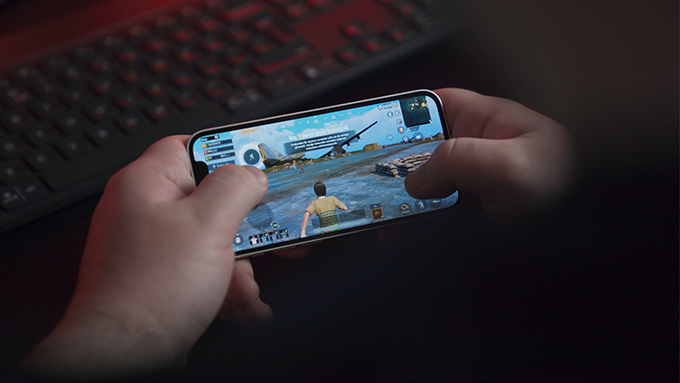Relationship between Duration of Playing Online Games and Sleep Disorders in Mardisiswa High School Students in the Era of the COVID-19 Pandemic

Background: Sleep disorders are disorders that refer to conditions that affect the quality, timing, or duration of sleep. Sleep disorders experienced by adolescents can contribute to medical problems and some mental health problems. There are around 73.7% of the population or the equivalent of 196.7 million internet users in Indonesia. One part of the internet that has influenced human life is online games.
Objectives: to determine out the relationship between the duration of playing online games and sleep disturbances among Mardisiswa high school students during the COVID-19 pandemic.
Methods: This research uses the type of analytic observational research. This cross-sectional study involved 72 students at SMA Mardisiswa who took the sample using the proportional random sampling method. The data collection process was carried out by distributing questionnaires online using the Google form. The variables measured were the duration of playing online games and sleep disturbance variables using the PSQI questionnaire. To analyze the data, the Fisher test was used. The independent variable is the duration of playing online games and the dependent variable is sleep disturbance.
Results: The results of the study show that there is a relationship between the duration of playing online games and sleep disturbances in students. This is shown by the results of the study using the Fisher test, namely p value (0.004) <α (0.05). PR value of 6.4 with 95% CI 1.82-22.53, indicating that students with a duration of playing online games two hours or more have a risk of sleep disturbance 6.4 times greater than students with duration of playing online games less than two hours.
Conclusions:Research concludes that the duration of playing online games and sleep disturbances are related or related. Therefore, it is necessary to have data regarding sleep disturbances and supported by socialization regarding this matter to teachers, parents and students.
Anggarani, F.K. (2015) ‘Internet Gaming Disorder: Psikopatologi Budaya Modern', Buletin Psikologi, 23(1), p. 1. Available at: https://doi.org/10.22146/bpsi.10572.
Anies (2021) Waspada! Susah Tidur. I. Edited by E. Swaesi. Jogjakarta: Ar-Ruzz Media.
APJII (2020) ‘Buletin APJII', Asosiasi Penyelenggara Jasa Internet Indonesia, p. 1. Available at: https://apjii.or.id/content/read/104/503/BULETIN-APJII-EDISI-74---November-2020.
APJII (2022) ‘Profil Internet Indonesia 2022'. Asosiasi Penyedia Jasa Internet Indonesia.
CDC (2022) Sleep and Sleep Disorders, Centers for Disease Control and Prevention.
Colten, H.R. et al. (2006) Sleep Disorders and Sleep Deprivation: An Unmet Pulic Health Problem. Washington DC.
Darchia, N. et al. (2018) ‘Relationship between sleep disorders and health related quality of life”results from the georgia SOMNUS study', International Journal of Environmental Research and Public Health, 15(8), pp. 1–15. Available at: https://doi.org/10.3390/ijerph15081588.
Lebho, M.A. et al. (2020) ‘Perilaku Kecanduan Game Online Ditinjau dari Kesepian dan Kebutuhan Berafiliasi pada Remaja', Journal of Health and Behavioral Science, 2(3), pp. 202–212. Available at: https://doi.org/10.35508/jhbs.v2i3.2232.
Levani, Y., Hakam, M.T. and Utama, M.R. (2020) ‘The Potential Addiction of Internet Use in Indonesian Adolescents in the Early Period of the Covid-19 Pandemic', Hang Tuah Medical journal, 17(2), p. 102. Available at: http://journal-medical.hangtuah.ac.id/index.php/jurnal1/article/view/437/89.
Manik, W.F. et al. (2021) ‘Kegiatan Selama Pandemi Covid-19: Belajar atau Bermain Game Online', Seminar Nasional Karya Ilmiah Multidisiplin, 1(1), pp. 256–258. Available at: https://www.google.com/amp/s/m.kumparan.com/amp/berita-hari-ini/macam-macam-.
Manuputty, J.C., Sekeon, S.A.. and Kandou, G.D. (2019) ‘Hubungan Antara Kecanduan Bermain Game Online Dengan Kualitas Tidur Pada Gamer Online Pengguna Komputer Di Warung Internet M2G Supernova Malalayang', Kesmas, 8(7), pp. 61–66.
Matur, Y.P., Simon, M.G. and Ndorang, T.A. (2021) ‘Hubungan Kecanduan Game Online dengan Kualitas Tidur pada Remaja SMA Negeri di Kota Ruteng', JWK, 6(2), pp. 55–66.
Mulyati, T. and NRH, F. (2018) ‘Kecanduan smartphone ditinjau dari kontrol diri dan jenis kelamin pada siswa SMA Semarang', Jurnal Empati, 7(4), pp. 152–161.
Nursiati, C.W. (2018) ‘Hubungan antara Kualitas Tidur dengan Tekanan Darah pada Siswa Kelas X-XI di SMA N 1 Kwadungan Kabupaten Ngawi', Amik Veteran, 63(2), pp. 1–3.
Oktavian, N., Nurhidayat, S. and Nasriati, R. (2019) ‘Pengaruh Durasi Bermain Terhadapt Adiksi Game Online Pada Remaja', Pengetahuan Orang Tua Tentang Jajanan Sehat Pada Anak, 3, pp. 11–24.
Rehman, A. (2022) Sleep Disorders, Sleep Foundation. Available at: https://www.sleepfoundation.org/sleep-disorders (Accessed: 22 October 2022).
Santosa, N.A. and Sundari, L.P.R. (2018) ‘Hubungan antara Durasi Bermain Game Online dengan Gangguan Tajam Penglihatan pada Anak Sekolah Menengah Pertama (SMP) di Kota Denpasar', Directory of Open Access Journals, 7(8).
Siregar, M.H. (2011) Mengenal Sebab-Sebab, Akibat-Akibat dan Cara Terapi Insomnia Dan Cara Terapi Insomnia. Yogyakarta: Flash Books.
Walker, M. (2021) Mengapa Kita Tidur: Mengungkap Kemampuan Tidur dan Bermimpi. Edited by A. Cynthia. Jakarta: PT Gramedia Pustaka Utama.
Wei, H.T. et al. (2012) ‘The association between online gaming, social phobia, and depression: An internet survey', BMC Psychiatry, 12(1), p. 1. Available at: https://doi.org/10.1186/1471-244X-12-92.
Zama, M.S., Kamariana and Annisa, A.N. (2022) ‘Hubungan Adiksi Game Online dengan Gangguan Pola Tidur pada Remaja', An Idea Health Journal, 2(1), pp. 55–59. Available at: https://doi.org/https://doi.org/10.53690/ihj.v2i01.81.
Copyright (c) 2023 Meuthia Rahmawati, Yuni Wijayanti

This work is licensed under a Creative Commons Attribution-ShareAlike 4.0 International License.
Media Gizi Kesmas by Unair is licensed under a Creative Commons Attribution-ShareAlike 4.0 International License.
1. The journal allows the author(s) to hold the copyright and to retain the publishing right of the article without restrictions.
2. The legal formal aspect of journal publication accessibility refers to Creative Commons Attribution-Share-Alike (CC BY-SA).
3. The Creative Commons Attribution-Share-Alike (CC BY-SA) license allows re-distribution and re-use of a licensed work on the conditions that the creator is appropriately credited and that any derivative work is made available under "the same, similar or a compatible license”. Other than the conditions mentioned above, the editorial board is not responsible for copyright violations.



















